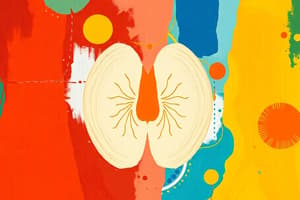Podcast
Questions and Answers
What are the primary hormones released by the thyroid gland?
What are the primary hormones released by the thyroid gland?
The primary hormones released by the thyroid gland are tetraiodothyronine (T4) and triiodothyronine (T3).
What does the term 'goiter' refer to?
What does the term 'goiter' refer to?
Goiter refers to the enlargement of the thyroid gland from any cause.
What is the role of calcitonin in the body?
What is the role of calcitonin in the body?
Calcitonin is needed for the regulation of calcium metabolism.
Why is iodine important for thyroid hormone synthesis?
Why is iodine important for thyroid hormone synthesis?
How do thyroid hormones affect energy regulation in the body?
How do thyroid hormones affect energy regulation in the body?
What are the potential consequences of thyroid hormone deficiency in early life?
What are the potential consequences of thyroid hormone deficiency in early life?
What are common problems associated with thyroid gland activity?
What are common problems associated with thyroid gland activity?
How does hyperactivity of the thyroid gland affect the body?
How does hyperactivity of the thyroid gland affect the body?
What are the normal monitoring levels for Free T4 and TSH in thyroid therapy?
What are the normal monitoring levels for Free T4 and TSH in thyroid therapy?
What is the most prescribed thyroid preparation for hypothyroidism?
What is the most prescribed thyroid preparation for hypothyroidism?
Why is liothyronine not recommended for routine replacement therapy?
Why is liothyronine not recommended for routine replacement therapy?
What are some disadvantages of using dessicated thyroid for treatment?
What are some disadvantages of using dessicated thyroid for treatment?
How often is levothyroxine administered to patients?
How often is levothyroxine administered to patients?
What risks are associated with using liothyronine in patients with cardiac disease?
What risks are associated with using liothyronine in patients with cardiac disease?
What is the shelf life of synthetic thyroid preparations like levothyroxine?
What is the shelf life of synthetic thyroid preparations like levothyroxine?
What is the toxicity relationship with levothyroxine?
What is the toxicity relationship with levothyroxine?
What is the primary action of thioamides in thyroid hormone synthesis?
What is the primary action of thioamides in thyroid hormone synthesis?
What is a notable adverse effect associated with thioamides?
What is a notable adverse effect associated with thioamides?
How do anion inhibitors affect thyroid function?
How do anion inhibitors affect thyroid function?
What is a specific use of potassium perchlorate?
What is a specific use of potassium perchlorate?
What role do iodides play in thyroid therapy?
What role do iodides play in thyroid therapy?
What is the maximum daily dose of iodides recommended?
What is the maximum daily dose of iodides recommended?
Why might cross-sensitivity be a concern with thioamide medications?
Why might cross-sensitivity be a concern with thioamide medications?
What is a significant rare adverse effect of potassium perchlorate?
What is a significant rare adverse effect of potassium perchlorate?
What is iodide trapping and which substances can inhibit it?
What is iodide trapping and which substances can inhibit it?
What role does thyroidal peroxidase play in iodine metabolism?
What role does thyroidal peroxidase play in iodine metabolism?
What is iodine organification and what compounds are formed during this process?
What is iodine organification and what compounds are formed during this process?
How are T4 and T3 formed from iodotyrosines?
How are T4 and T3 formed from iodotyrosines?
What inhibits the release of thyroid hormones from thyroglobulin?
What inhibits the release of thyroid hormones from thyroglobulin?
What is the primary transport protein for T4 and T3 in the plasma?
What is the primary transport protein for T4 and T3 in the plasma?
How is thyroxine metabolized in the body?
How is thyroxine metabolized in the body?
Which physiological factors can affect the transport of T4 and T3?
Which physiological factors can affect the transport of T4 and T3?
What are the main problems associated with the use of radiation in treating hyperthyroidism?
What are the main problems associated with the use of radiation in treating hyperthyroidism?
Why are beta blockers used in the treatment of thyrotoxicosis?
Why are beta blockers used in the treatment of thyrotoxicosis?
What is a thyroid storm and why is it considered life threatening?
What is a thyroid storm and why is it considered life threatening?
List two treatments administered during a thyroid storm.
List two treatments administered during a thyroid storm.
What surgical procedure is recommended for women with thyrotoxicosis during pregnancy?
What surgical procedure is recommended for women with thyrotoxicosis during pregnancy?
What role do corticosteroids play in the treatment of thyroid storm?
What role do corticosteroids play in the treatment of thyroid storm?
What is the significance of using iodinated contrast in the treatment of thyrotoxicosis?
What is the significance of using iodinated contrast in the treatment of thyrotoxicosis?
Why should radiation not be given to pregnant women or nursing mothers?
Why should radiation not be given to pregnant women or nursing mothers?
Flashcards are hidden until you start studying
Study Notes
Introduction
- The normal adult thyroid gland weighs between 15-25 grams and is butterfly-shaped, located at the front of the neck.
- Enlargement of the thyroid due to various causes is termed "Goiter."
- Primary hormones released by the thyroid include tetraiodothyronine (thyroxine, T4), triiodothyronine (T3), and calcitonin.
- T3 and T4 are crucial for growth, development, energy regulation, and maintaining normal body temperature.
- Calcitonin helps regulate calcium metabolism and is essential for skeletal and reproductive health.
- Deficiency in T4 or T3 during infancy can lead to irreversible mental retardation and dwarfism.
- Thyroid hormones influence other hormones, including catecholamines, estrogens, and cortisol, and regulate the metabolic rate of most tissues.
Hormone Synthesis and Release
- Iodide is actively transported into the thyroid gland, known as iodide trapping; this process can be inhibited by certain anions.
- Iodide is converted to iodine by thyroidal peroxidase, which is inhibited by thioamides and excess iodide.
- Iodine iodinates tyrosine residues in thyroglobulin, resulting in monoiodotyrosine (MIT) and diiodotyrosine (DIT).
- Two DIT molecules form T4, while one MIT and one DIT yield T3.
- T4 and T3 are released from thyroglobulin through exocytosis; excess MIT and DIT are deiodinated for iodine recycling.
- The ratio of T4 to T3 released is 5:1, with most circulating T3 deriving from peripheral conversion of T4.
Transportation and Metabolism
- T4 and T3 mostly bind irreversibly to thyroxine-binding globulin (TBG) in plasma, with free forms constituting 0.04% of T4 and 0.4% of T3.
- Major metabolic pathways for T4 include deiodination, leading to the active T3 form, which is 3-4 times more potent than T4.
- Routine monitoring of free T4 and TSH levels is crucial, typically reaching steady state 6-8 weeks post-therapy initiation.
Thyroid Preparations
- Synthetic thyroid preparations like levothyroxine, liothyronine, and liotrix are used for hypothyroidism, with levothyroxine being the most commonly prescribed due to its stability and cost-effectiveness.
- Levothyroxine has a long half-life of 7 days and is administered once daily; it converts intracellularly to T3.
- Liothyronine has a shorter half-life (about 24 hours) and is not recommended for routine use due to multiple daily dosing and potential cardio toxicity.
- Animal-derived preparations such as desiccated thyroid have drawbacks, including variable hormone concentration and antigenicity.
Anti-Thyroid Agents
- Thioamides inhibit coupling of iodotyrosines and peripheral deiodination of T4 to T3, taking 3-4 weeks for clinical effects to manifest due to hormone store depletion.
- Adverse effects of thioamides occur in 3-12% of patients, with common reactions including rash and fever, and rare effects like agranulocytosis and hepatitis.
- Anion inhibitors (e.g., perchlorate, SCN^-, pertechnetate) block iodide uptake but can be reversed by high iodide doses.
- Iodides inhibit hormone release and decrease thyroid size; however, they may induce hyperthyroidism in susceptible individuals and are contraindicated in pregnancy.
Beta Blockers
- Beta blockers like propranolol are effective for managing symptoms of thyrotoxicosis, as symptoms mirror sympathetic stimulation.
- Non-selective beta blockers are preferred, especially in patients resistant to other therapies.
Special Conditions
Thyroid Storm
- A life-threatening thyrotoxic crisis characterized by an acute exacerbation of thyrotoxicosis symptoms.
- Treatment includes propranolol, calcium channel blockers, potassium iodide, thioamides, and corticosteroids to mitigate effects.
Thyrotoxicosis in Pregnancy
- Recommended treatment involves subtotal thyroidectomy and I^131^, with operative management necessary during the mid-trimester, supplemented post-surgery with thyroid hormones.
Studying That Suits You
Use AI to generate personalized quizzes and flashcards to suit your learning preferences.




